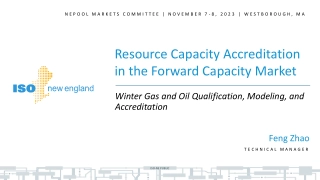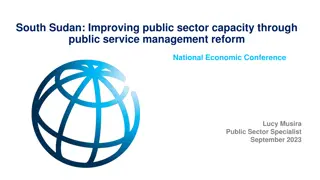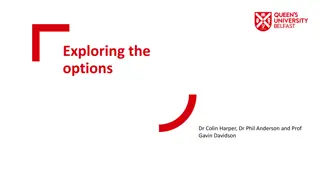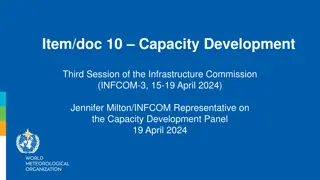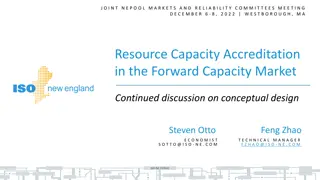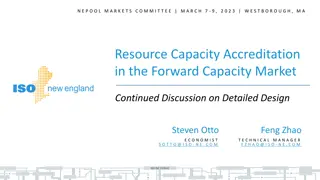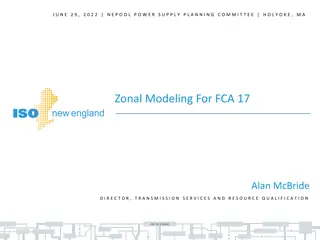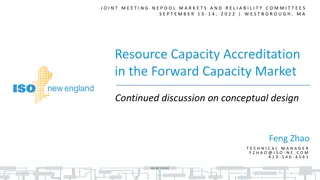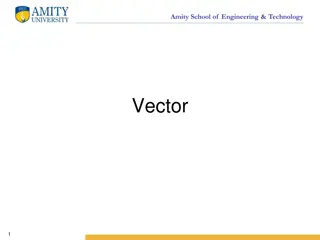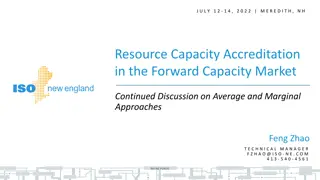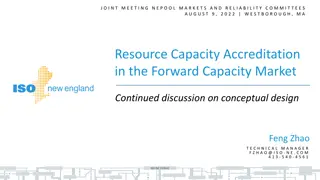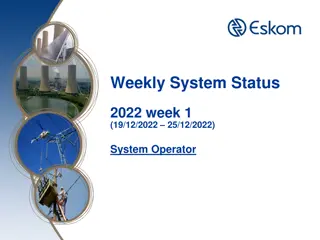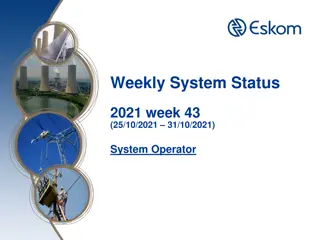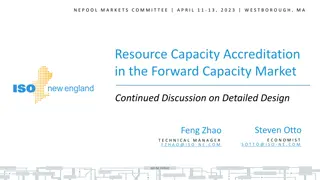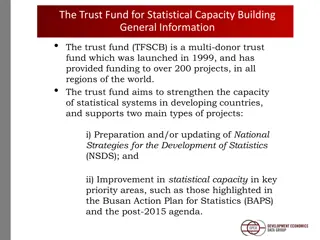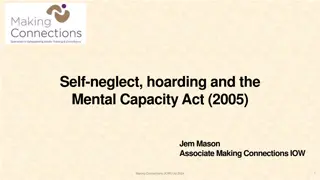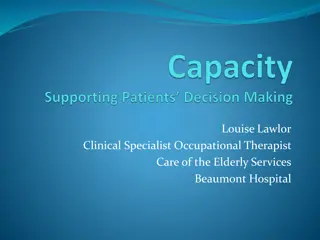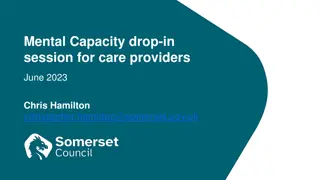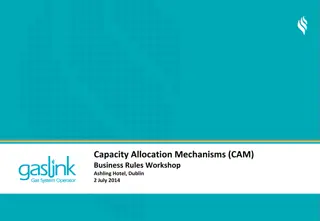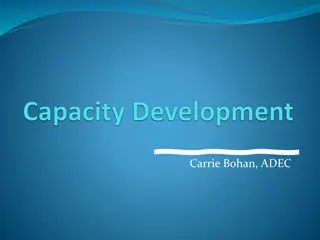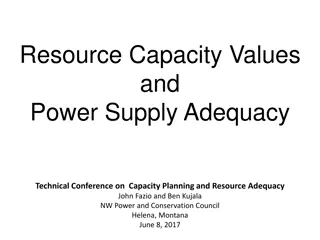DRRS Design to Meet HB1500 Intent
The primary goal of the DRRS in line with HB1500 is to determine the quantity of services required based on historical variations in generation availability to uphold targeted reliability standards. The system must be able to shed firm load during extreme events, particularly severe winter storms, a
0 views • 6 slides
Enhancing Public Service Professionalization Through National School of Government Positioning
This presentation outlines the strategic response to public service reform towards professionalization by positioning the National School of Government (NSG) to build state capacity, address deficiencies in various departments, and strengthen governance for effective service delivery in South Africa
0 views • 19 slides
Resource Capacity Accreditation in the Forward Capacity Market
The presentation discusses the Resource Capacity Accreditation (RCA) project in the Forward Capacity Market (FCM) by ISO-NE, aiming to improve accreditation processes to support a clean-energy transition. It emphasizes modeling and accrediting gas and oil resources for resource adequacy as the energ
0 views • 38 slides
Enhancing Public Sector Capacity Through Service Management Reform
South Sudan is working on improving public sector capacity through service management reform, focusing on institutionalizing capacity building, pay and grading, pension support, and strengthening the center of government. Lessons from capacity injection mechanisms and policy frameworks are guiding t
0 views • 16 slides
Global Hydrogen Projects Outlook and Electrolyzer Capacity Analysis
This outlook delves into the IEA Hydrogen Production Projects Database to provide an update on the status of global hydrogen projects. It covers the timing and capacity of new electrolyzer installations, projecting significant growth in electrolyzer capacity by 2030 to meet Net Zero Emissions Scenar
1 views • 16 slides
ERCOT CONE Study: Reference Technology Selection for Thermal Dispatchable Plant
The ERCOT CONE study focuses on selecting a reference technology for a thermal dispatchable plant in ERCOT, providing a basis for Cost of New Entry (CONE) calculations. The study reviews characteristics of existing and upcoming plants to determine the preferred technology. The proposed specification
3 views • 21 slides
Exploring Key Distinctions in Legal and Mental Capacity Frameworks
This presentation delves into the crucial distinctions within the legal and mental capacity frameworks, focusing on concepts such as legal personhood, legal capacity, and mental capacity as defined in the MCA (NI) 2016. It explores the implications of these distinctions on decision-making abilities
4 views • 23 slides
DRRS Design to Meet HB1500 Intent
DRRS design aims to meet the requirements of HB1500 in determining the quantity of services needed for reliability standards in ERCOT grid operations. The primary goal is to ensure operational reliability during extreme events with a focus on dispatchable generation facilities. DRRS resources must b
0 views • 6 slides
INFCOM Capacity Development Initiatives Overview
INFCOM's capacity development initiatives focus on enhancing Earth system observations, closing capacity gaps on weather services, and supporting new opportunities in competencies and capabilities. Collaboration and coordination mechanisms have been established to facilitate sharing of information a
0 views • 11 slides
Investigation of Marginal ELCC Generation Methodology for Renewable Technologies with Storage Combinations
This project aims to develop a methodology to calculate Marginal ELCCs for non-dispatchable technologies like Solar PV and Wind, along with various storage durations. It proposes leveraging SERVM for LOLE Events, analyzing peak shaving capabilities of storage technologies, and evaluating ELCC via si
0 views • 10 slides
Understanding Disk Storage Systems in Computer Science
Disk storage systems play a crucial role in computer architecture. This tutorial delves into the differences between disks and main memory in terms of access time, capacity calculations, block sizes, rotational delays, and transfer rates. It covers key concepts such as track capacity, surface capaci
0 views • 23 slides
Joint NEPOOL Markets and Reliability Committees Meeting December 6-8, 2022, Westborough, MA
A meeting discussing Resource Capacity Accreditation in the Forward Capacity Market, focusing on improving accreditation processes to support a reliable transition to clean energy. The presentation outlines the proposed improvements for FCA 19, emphasizing the accreditation of resources based on the
0 views • 81 slides
Maximizing Distributed Energy Resources Through Virtual Power Plants in Texas
Texas is exploring the deployment of Virtual Power Plants to enable customers with Distributed Energy Resources (DERs) to participate in providing dispatchable Megawatts and Ancillary Services. The state recognizes the potential of DERs, with projections indicating a significant capacity increase in
0 views • 24 slides
Resource Capacity Accreditation in Forward Capacity Market Overview
Resource Capacity Accreditation project aims to enhance ISO-NE's accreditation processes in the Forward Capacity Market, supporting a reliable, clean-energy transition. Key concepts covered in this educational presentation include accreditation space, methods, benefits, challenges, and improvement o
1 views • 53 slides
Resource Capacity Accreditation in the Forward Capacity Market Discussion
The presentation discusses improvements in the Resource Capacity Accreditation project of ISO-NE's Forward Capacity Market to support a reliable, clean-energy transition. It includes details on seasonal components, reconfiguration auctions, trading obligations, and stakeholder schedules. Examples pr
3 views • 71 slides
Capacity Zone Modeling for Forward Capacity Auction 17 Results
This presentation unveils the Capacity Zone modeling calculations for Forward Capacity Auction 17 associated with the 2026-2027 Capacity Commitment Period by ISO-NE PUBLIC. It delves into boundary definitions, import-constrained zone modeling, and market rules guiding the assessments and modeling pr
0 views • 16 slides
Resource Capacity Accreditation in Forward Capacity Market Discussions
Discussion on the conceptual design for Resource Capacity Accreditation in the Forward Capacity Market, focusing on improvements to accreditation processes to support a reliable transition to clean energy. The presentation outlines methodologies to accredit resource contributions, commitments to pro
0 views • 34 slides
Understanding Amity School of Engineering & Technology Vectors in Java
Amity School of Engineering & Technology Vectors provide a flexible way to manage dynamic arrays in Java programming. With capabilities to store objects of any type and accommodate dynamic resizing, these vectors offer optimized storage management through capacity and capacity increment settings. Co
0 views • 18 slides
Resource Capacity Accreditation in Forward Capacity Market Discussion
The Resource Capacity Accreditation project by ISO-NE aims to enhance accreditation processes in the Forward Capacity Market. This presentation reviews key concepts, including nomenclature, Marginal vs. Average approaches, and follow-up items from previous meetings. It emphasizes the commitment to a
0 views • 41 slides
Forward Capacity Market Resource Capacity Accreditation Discussion
Discussion on improvements to resource capacity accreditation in the Forward Capacity Market to support a reliable, clean-energy transition by accrediting resource contributions effectively as the resource mix evolves. Covers conceptual design, stakeholder schedule, and review of proposed enhancemen
0 views • 61 slides
Proposal for Resource Capacity Accreditation in Forward Capacity Market
The ISO-NE has proposed improvements to the accreditation processes in the Forward Capacity Market (FCM) through the Resource Capacity Accreditation (RCA) project. The aim is to enhance the accreditation of resource contributions to ensure reliability during the transition to a cleaner energy mix. T
0 views • 59 slides
Weekly System Status 2022 - Week 1 (19/12/2022 - 25/12/2022) Analysis
This weekly report provides insights into the National Electricity Supply System's adequacy, including data on system capacity, demand, dispatchable generation, and more. The report highlights historical peak system capacity and demand, residual load forecasts, actual demand statistics, and dispatch
0 views • 13 slides
Weekly System Status 2021: Week 43 Overview
This weekly report provides an overview of the National Electricity Supply System's performance for Week 43 of 2021 (25th to 31st October). It includes data on historic daily peak system capacity, dispatchable generation, energy sent out, and operating reserve margins. The report aims to offer insig
6 views • 13 slides
Understanding Mental Health Legislation and Capacity Assessments
This content provides information on various aspects of mental health legislation, including the Mental Health Act 1983, the Mental Capacity (Amendment) Act 2019, and the implications for individuals objecting or consenting to treatment. It explores scenarios where different legal provisions apply,
0 views • 13 slides
Resource Capacity Accreditation in the Forward Capacity Market: Continued Discussion and Detailed Design
The Resource Capacity Accreditation (RCA) project by ISO-NE aims to enhance accreditation processes in the Forward Capacity Market (FCM) to support a reliable, clean-energy transition. This presentation focuses on seasonal components of Capacity Supply Obligations (CSO), Pay-for-Performance (PFP) ob
0 views • 58 slides
Weekly System Status Update: Adequacy of National Electricity Supply (Week 47, 2023)
This weekly system status report compiled by the System Operator provides insights into the National Electricity Supply System's adequacy in the medium term. It includes data on historic daily peak system capacity/demand, available dispatchable generation, operating reserve margin, forecast vs. actu
1 views • 14 slides
The Trust Fund for Statistical Capacity Building
The Trust Fund for Statistical Capacity Building (TFSCB) is a multi-donor trust fund launched in 1999, supporting over 200 projects worldwide to strengthen statistical systems in developing countries. It focuses on national strategy development and improving statistical capacity in key priority area
1 views • 5 slides
Understanding Self-Neglect, Hoarding, and the Mental Capacity Act (2005)
Self-neglect and hoarding are complex issues often intertwined with mental capacity challenges. The Mental Capacity Act (2005) outlines capacity assessments, decision-making criteria, and challenges faced by professionals in safeguarding individuals. Recognizing the need for trauma-informed care in
1 views • 16 slides
Understanding Legal and Mental Capacity in Healthcare Decisions
Clinical specialist occupational therapist, Louise Lawlor, advocates for patients' rights and decision-making capacity in healthcare settings. She emphasizes the importance of legal and mental capacity in making informed decisions, highlighting relevant legislation, guidance documents, and a functio
0 views • 24 slides
Exploring Capacity and Volume in Practical Settings
Explore the concepts of volume and capacity through engaging activities involving measuring liquid in containers, understanding units like milliliters and liters, and solving capacity-related questions. Discover how to work out different measurements and practice practical capacity in the kitchen wi
0 views • 7 slides
Understanding Enthalpy and Heat Capacity in Chemistry
Enthalpy is a measure of total energy in a system, represented as H = E + P.V. Heat at constant pressure relates to enthalpy changes. Calorimetry and heat capacity help measure and understand heat in chemical reactions. Specific heat capacity and molar heat capacity play key roles in determining ene
0 views • 16 slides
Workshop on New Approaches to Statistical Capacity Development in Lao PDR
This workshop, hosted by PARIS21 and UNDP, focuses on enhancing statistical capacity development in Lao PDR. It covers topics like successful capacity development programs, partnerships for national statistics development, and prioritizing needs versus international requirements. The Lao Statistics
0 views • 15 slides
Load Following by Nuclear Power Plants in Relation to Variable Renewable Energies' Development
The study explores the requirements of load following by nuclear power plants in the context of variable renewable energies' growth. It discusses the impact of renewable energy development on nuclear economic models and the need for dispatchable capacities. Benchmarks are set to test robustness of d
0 views • 11 slides
Changes in Capacity Allocation Regulations for Gas Infrastructures in Portugal
The new regulation in Portugal brings significant changes in capacity booking and trading to promote convergence with CAM NC and enable a secondary market. Major changes include ex-ante payment of capacity rights, capacity allocation via a booking platform, and enhancement of liquidity in the second
0 views • 13 slides
The Assisted Decision-Making (Capacity) Act 2015 in the Criminal Justice Context
The Assisted Decision-Making (Capacity) Act 2015 introduces key reforms such as the abolition of wards of court system for adults, a statutory functional test of capacity, new guiding principles, a three-tier framework for support, and tools for advance planning. It emphasizes functional assessment
0 views • 17 slides
Understanding Capacity Challenges in Wills: Legal Insights
Testators must possess mental capacity when making a will, as established in legal cases like Banks v. Goodfellow. The common law test for testamentary capacity remains relevant despite the Mental Capacity Act 2005. The Banks v. Goodfellow test outlines the required mental power for making a valid w
0 views • 18 slides
Somerset Mental Capacity Training Session June 2023
This information outlines a mental capacity drop-in session for care providers in June 2023, hosted by Chris Hamilton from Somerset Council. It covers topics like the aim of the Mental Capacity Act, the Somerset mental capacity competency framework, and the importance of staff training. It emphasize
0 views • 21 slides
Capacity Allocation Mechanisms (CAM) Business Rules Workshop Summary
This summary provides insights into the Capacity Allocation Mechanisms (CAM) Business Rules Workshop held at Ashling Hotel, Dublin on July 2, 2014. The workshop covered topics such as CAM business rules scope, key features, auction processes, code modifications, implementation timelines, and consult
0 views • 32 slides
Understanding Capacity Development in Water Systems
Capacity development is crucial for water systems to acquire and maintain technical, managerial, and financial capabilities in order to consistently provide safe drinking water. Federal requirements mandate new public water systems to demonstrate capacity, with states required to have strategies to
0 views • 8 slides
Resource Capacity Values and Power Supply Adequacy Conference Highlights
Explore insights from the Resource Capacity Values and Power Supply Adequacy Technical Conference, covering topics like integrated vs. standalone capacity values, utilizing hydro storage to increase capacity, and the 2021-22 Adequacy Summary. Learn about the importance of integrated capacity values
0 views • 9 slides


